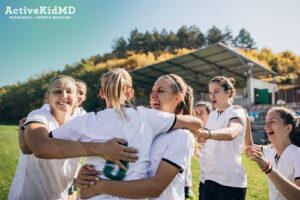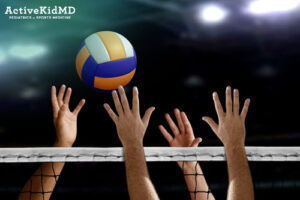Imagine learning that you have made an Olympic roster. Your hard work and persistence have paid off with an opportunity to represent yourself and your country in a competition viewed by millions. You have the chance to realize a dream and hopefully finish on the podium with an Olympic medal.
In a moment of great joy, it is also not uncommon to have conflicting feelings of anxiety and uncertainty. You may wonder, “Did I truly earn this? Am I fully ready for this? How do I handle the pressure of my expectations and those of family, coaches, and teammates?”
You might not be an Olympic athlete, but mental preparation for an important tournament or competition might involve dealing with a set of unique emotional demands:
- Developing and maintaining a good attitude
- Being prepared to deal with distractions and unexpected events
- Expecting the unexpected
- Sticking with their routine – sleep, meals, workouts, etc.
- Dealing with any injury
- Dealing with the housing (hotel or Olympic Village)
- Having a plan for dealing with family and friends
- Being ready to handle the media
How do we help athletes address these concerns in mental preparation for the Olympic Games, and how can you benefit from the same approach and recommendations?
See our interview with Volleyball Magazine editor, Lee Feinswog:
Making it Real
There is great joy in congratulating one of our athletes on making the Olympic roster and then looking them in the eye and asking, “How are you doing with all this?”
When working with the USA Volleyball National Teams, we discuss mental preparation from the outset. Just like we ask about injuries and illness, we have questions in our pre-season assessments about mental health.

We know that unresolved depression, anxiety, or other mental health issues can affect how an athlete performs on the court, as well as with relationships at the gym and at home.
Our athletes regularly get asked by staff and even teammates about how they are handling expectations and pressures. Our goal is to normalize talking about emotional health. Just like mentioning knee or back pain, feelings of uncertainty or doubt should be open to discussion and treatment.
We look at addressing mental health needs as part of performance enhancement, not just for the months leading up to and including the Olympics, but also for the time after the Games are over.
Our student athletes should not hesitate to bring up mental health issues and seek assistance. Ideally, all athletes should have the same freedom to get mental health needs met.
How Do I Deal with My Family and Loved Ones?
One of the many special highlights of my Olympic experience: after beating Cuba 3-0 to earn a spot in the Gold Medal match, one of our key players came off the court looking somewhat saddened because her mother had left the night before to return home for work (or so she thought). Unbeknownst to her, mother rearranged her schedule to stay through that semifinal match but didn’t want to be a distraction and thus didn’t tell her daughter. When they met up after the match, their celebratory hugs brought tears both to each other and to many of us fortunate to share in their special moment.
When looking at the Olympic Games, it is often said there are two athlete vantage points:
This is the biggest competition of my career. While most people are here to celebrate and partake in a party-like atmosphere, this needs to be considered as the ultimate business trip with limited to no distractions.
There are so many unique opportunities at the Games such as the open/closing ceremonies and living in the Village and I don’t want to miss out on enjoying them with my family, friends, and other loved ones.
I remember when reading the athlete/staff handbook before my Olympic journey to Beijing in 2008. One of the most detailed portions included tips relating to family and friends coming to the Games.
Most athletes want to develop a blend of the two mental preparation vantage points – keeping focus on the business element of the competition while sharing with those who played big roles in the process of the achievement.
Experience has taught us that targeted conversations (and often several) about expectations and schedules can help prepare families and loved ones to best support their athletes. USA Volleyball, like many other national team organizations, will arrange group activities, tours, and meeting events to help provide structure and take schedule pressure off athletes (believe it or not, we even had “team parents” take on these key roles).
Athletes who were most comfortable and expressive in making desires known to family (and staff), and families who understand those needs all seemed to have the best overall experience during the Games.
Once the Games are over
The end of each Olympics brings an end to a 4-year cycle (or in the case of the Paris Games, a 3-year cycle), and the months after the Games bring many other unique events. Retirements from national teams will be declared, plans made for weddings or expanding families, preparations for club seasons, and more than just a little bit of uncertainty (am I ready for another 4-year run?) will also make the rounds.
Supporting the emotional health of our athletes is just as key once the Games are over. Not only is there the need to evaluate personal and team performance, but also to assist with the transition to the post-Games stage. Those “what’s next” discussions ideally don’t start once the Games are over, they have usually been initiated far beforehand.
There are athletes who prefer a laser-like focus on the Games and will deal with after-Games stages only after they have competed. This is not the usual.
Most players want some idea of a post-Olympic strategy. Some develop a more general framework while others have a detailed plan in place.
Giving permission to acknowledge post-Games uncertainty and providing resources (including speaking with past Olympians on their journeys) is part of our duty.
Transitions are part of life that may come up on a schedule (like graduations or the completion of careers/Quads) or more abruptly (like injuries).
The Olympics can be pretty overwhelming when it comes to the magnitude of the competition, other athletes, and juggling family and friends attending the event. Prioritizing mental health conversations as normal and essential can contribute to optimal mental preparation and physical performance at the Games.





